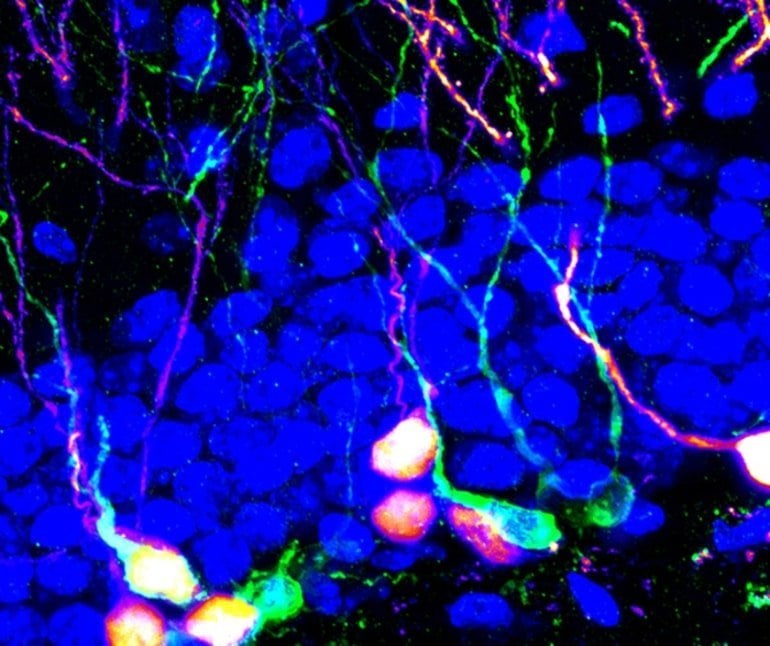Summary: Researchers used optogenetics techniques to stimulate specific brain areas to increase neurogenesis and the production of neural stem cells to improve memory, cognition, and emotional processing in animal models.
Source: UNC Health Care
We humans lose mental acuity, an unfortunate side effect of aging. And for individuals with neurodegenerative conditions such as Alzheimer’s and Parkinson’s, the loss of cognitive function often accompanied by mood disorders such as anxiety is a harrowing experience. One way to push back against cognitive decline and anxiety would be to spur the creation of new neurons.
For the first time, University of North Carolina School of Medicine scientists have targeted a specific kind of neuron in mice to increase the production of neural stem cells and spur on the creation of new adult neurons to affect behavior.
Targeting these cells, as reported in the journal Nature Neuroscience, modulated memory retrieval and altered anxiety-like behaviors in mice. Essentially, the UNC scientists boosted the electrical activity between cells in the hypothalamus and the hippocampus to create new neurons – an important process called neurogenesis.
“Targeting the hypothalamic neurons to enhance adult hippocampal neurogenesis will not only benefit brain functions,” said senior author Juan Song, PhD, associate professor of pharmacology, “but also holds the potential to treat cognitive and affective deficits associated with various brain disorders.”
Most neurons we carry for life were created before we were born and get organized during early childhood. But such neurogenesis continues into adulthood and throughout life. In fact, one of the reasons for cognitive decline and anxiety, and even diseases such as Alzheimer’s, is the suspension of neurogenesis.
Song, a member of the UNC Neuroscience Center, has been studying the detailed interplay between brain cells that keep neurogenesis chugging along. She knew that adult hippocampal neurogenesis plays a critical role in memory and emotion processing, and that neural circuit activity – think ‘electrical activity’ – regulates this process in a constantly changing manner.

What no one knew is whether this neural circuit activity could be manipulated to spur neurogenesis to such a degree that the effect would be seen as a changed behavior, such as better memory or less anxiety.
To see the effect of modulating neural activity, the Song lab conducted experiments led by co-first authors Ya-Dong Li, PhD, and Yan-Jia Luo, PhD, both postdoctoral fellows. They used optogenetics – essentially a method using light to trigger neuronal activity – in a small brain structure called supramammillary nucleus (SuM). The SuM is located inside the hypothalamus region of the brain; it helps manage things from cognition to locomotion and sleep/wakefulness.
When Song’s researchers chronically stimulated the SuM neurons, they discovered a robust promotion of neurogenesis at multiple stages. They observed increased production of neural stem cells and the creation of new adult-born neurons with enhanced properties. Optogenetic stimulation of these new neurons then altered memory and anxiety-like behaviors.
“We also show that the SuM neurons are highly responsive when the mice experienced new things in their environment,” Song said. “In fact, in a new environment, mice require these cells for neurogenesis.”
Impaired adult hippocampal neurogenesis correlates with many pathological states, such as aging, neurodegenerative diseases, and mental disorders.
“Therefore,” Song added, “targeting the hypothalamic neurons to enhance adult hippocampal neurogenesis will not only benefit brain functions but also holds the potential to treat cognitive and affective deficits associated with various brain disorders.”
Funding: This research was funded through National Institutes of Health, the Alzheimer’s Association, and NARSAD Young Investigator Award from the Brain & Behavior Research Foundation.
Confocal microscopy was performed at the UNC Neuroscience Microscopy Core Facility (RRID: SCR_019060) with technical assistance from Michelle Itano. The UNC Neuroscience Microscopy Core was supported in part by funding from NIH-NINDS Neuroscience Center Support Grant (P30 NS045892) and a NIH-NICHD Intellectual and Developmental Disabilities Research Center Support Grant (U54 HD079124).
About this neurogenesis research news
Author: Mark Derewicz
Source: UNC Health Care
Contact: Mark Derewicz – UNC Health Care
Image: The image is credited to Song Lab, UNC-CH
Original Research: Closed access.
“Hypothalamic modulation of adult hippocampal neurogenesis in mice confers activity-dependent regulation of memory and anxiety-like behavior” by Juan Song et al. Nature Neuroscience
Abstract
Hypothalamic modulation of adult hippocampal neurogenesis in mice confers activity-dependent regulation of memory and anxiety-like behavior
Adult hippocampal neurogenesis plays a critical role in memory and emotion processing, and this process is dynamically regulated by neural circuit activity. However, it remains unknown whether manipulation of neural circuit activity can achieve sufficient neurogenic effects to modulate behavior.
Here we report that chronic patterned optogenetic stimulation of supramammillary nucleus (SuM) neurons in the mouse hypothalamus robustly promotes neurogenesis at multiple stages, leading to increased production of neural stem cells and behaviorally relevant adult-born neurons (ABNs) with enhanced maturity.
Functionally, selective manipulation of the activity of these SuM-promoted ABNs modulates memory retrieval and anxiety-like behaviors.
Furthermore, we show that SuM neurons are highly responsive to environmental novelty (EN) and are required for EN-induced enhancement of neurogenesis. Moreover, SuM is required for ABN activity-dependent behavioral modulation under a novel environment.
Our study identifies a key hypothalamic circuit that couples novelty signals to the production and maturation of ABNs, and highlights the activity-dependent contribution of circuit-modified ABNs in behavioral regulation.







